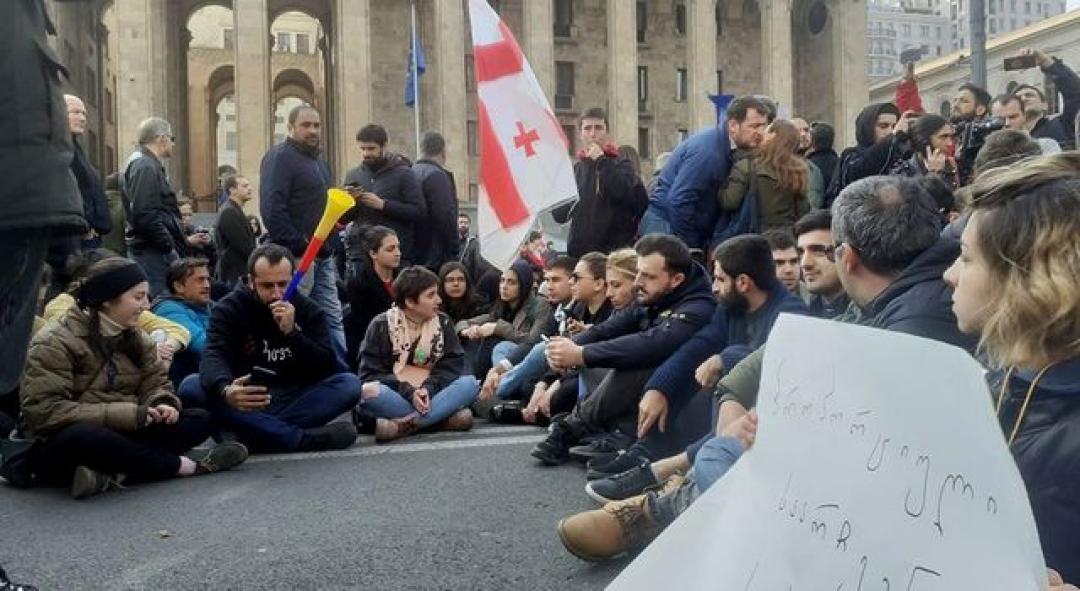
Political crisis in Georgia as the adoption on the law introducing the proportional election system fails

On 14 November, the proposed bill by the ruling Georgian Dream party was not adopted, as 101 parliamentarians voted in favour, instead of the mandatory 113. 141 out of a total of 150 parliamentarians were registered for the vote. However, 37 abstained from voting and three voted against.
As a result, seven members left the Georgian Dream party immediately after the vote failed, including Vice Parliament Speaker of Georgia Tamar Chugoshvili and the parliamentarians Irina Pruidze, Giorgi Mosidze, Dimitri Tskitishvili, Tamar Khulordava, Sophio Katsarava and Zaza Khutsishvili.
“Today was a very difficult majority session, I think that the outcome would not matter and it was anyways going to be a loss for the part. It is very difficult for me to talk about the future now. This process or moving to the opposition was not planned by us,” said Chugovili.
“It was not easy for me to go against the leader's decision. With my decision I supported the long-term, stable development of the country. It was a responsible decision for our country,” said Dimitri Khundadze, one of the three Georgian Dream parliamentarians who voted against the bill. “We continue to fight for a large number of supporters to continue our righteous political life and avoid the threats and fluctuations that the draft[ed] law [for a] proportional electoral system entails,” he added.
The opposition voted for the bill as they feared that the ruling party “planned to scrap the bill, as the fully proportional election system is not in the interests of any ruling party.” The chairman of the opposition United National Movement (UNM) Grigol Vashadze said a day earlier that “either the 2020 elections will be held under the proportional system, or we will take to streets.” After the bill failed, demonstrators who participated in the June rallies and the opposition blocked Rustaveli Avenue in central Tbilisi and announced the “largest rallies ever”. “Bidzina Ivanishvili and the Georgian Dream have [create a] political crisis by making [this decision]. The 2020 elections are falsified today. The turning point has come. If we allow Georgian Dream to pass this system, Georgia's future will have no prospects,” said the chairman of the European Georgia Party Davit Bakradze.
Parliament Speaker Archil Talakvadze stated that after the failure to adopt the bill, the 2020 elections will be conducted with a mixed-electoral system, a three percent election threshold and election blocs will be allowed to participate in.
“Today when our country is on the path of democratic development as the leader of the ruling political party, I consider it necessary to respond to the processes that are unfolding in the Parliament these days. I am disappointed that in the end, our initiative was rejected. Unfortunately, the bill was rejected because [in]… part of the Georgian Dream's deputies. With my team and Government, I can guarantee that Georgia's democratic development process will be irreversible. The free and fair elections of 2020 will be an example for this,” stated the chairman of the Georgian Dream party Bidzina Ivanishvili. He also added that “if the opposition supported the election bill in 2017, there will be no discussions regarding the issue now and the decision on the move to the fully proportional elections from 2020 would have been made several years ago.”
Prior to the vote, Georgian Prime Minister Giorgi Gakharia urged parliamentarians to support the bill. He stated that proportional elections would be an “essential step” for the democratic development of the country and he expressed his hopes “that each MP will fully share the responsibility assumed towards the democratic development of the country and each citizen of Georgia when voting.”
The Lelo movement, headed by Mammuka Khazaradze, also vowed the parliamentarians to support the bill prior to the voting. “Following the June 20 violence, Bidzina Ivanishvili's pledge to shift to a proportional electoral system was a major achievement of the joint public and oppositional forces and a progressive step towards the country's orderly advancement. By overlooking the agreement, the ruling party endangers the peaceful enactment of democratic processes. All of this serves to deprive people of their right to vote,” read the Lelo statement.
The EU ambassador to Georgia Carl Hartzell also commented prior to the voting procedure. “The EU has abstained from voicing an opinion on whether or not a proportional system was the better option for Georgia in view of the 2020 parliamentary elections since this is primarily the choice of the Georgian people and the political parties. Since summer, however, there has been a political consensus and a joint commitment to work in this direction. Against this background, I see a clear risk that going back on this commitment at this stage would be seen as breaking the trust among the political parties, the trust with wider segments of the population, and to again increase the polarisation in the run-up to the 2020 elections. I hope the parliament will take this into account in their vote later today,” he said.
See Also


Simonyan: “Armenia Should Trade with Turkey and Azerbaijan Instead of Closing Borders”

Mirzoyan Meets US Deputy Assistant Secretary Joshua Huck

Azerbaijani President Holds Talks with UAE and German Business Delegations on Economic Cooperation

Grigoryan Confirms Armenia’s Readiness to Dissolve OSCE Minsk Group Upon Peace Treaty Signing

